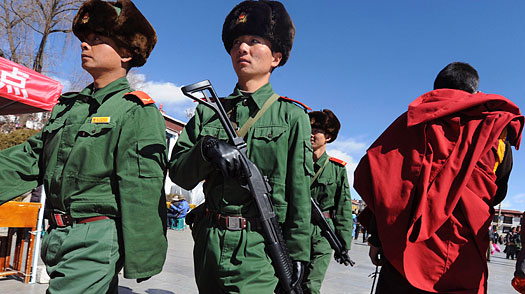 China’s severe religious freedom violations showed no signs of slowing last year, the United States Commission on International Religious Freedom (USCIRF) has reported, with Tibetan Buddhists remaining high on the list of persecuted groups.
China’s severe religious freedom violations showed no signs of slowing last year, the United States Commission on International Religious Freedom (USCIRF) has reported, with Tibetan Buddhists remaining high on the list of persecuted groups.
The country has been labelled as one of nine nations of “particular concern” worldwide, and abuses are described in the document as “systematic, ongoing and egregious,” including torture, arbitrary detentions and disappearances.
One particular section of the document highlights how Tibetan Buddhists are being prevented from carrying out cultural and religious practices, with those monasteries still standing under constant surveillance from armed Chinese officials.
The 143 self-immolations to date – more than any other country – remain stark proof, according to USCIRF, of the Chinese government’s oppressive policies, as do the deaths in prison of high profile Tibetans such as revered spiritual leader, Tenzin Delek Rinpoche.
Rinpoche died 20 years after having been incarcerated for separatism and terrorism, a charge he always vehemently denied. With torture allegations already rife throughout the country, his body was then cremated against his family’s will, an act considered by many as proof of foul play.
The year 2015 saw many prominent dates for Tibetans including His Holiness the Dalai Lama’s 80th birthday, the 50th anniversary of Beijing’s control over the Tibet Autonomous Region, and the 20th anniversary of the disappearance of the Panchen Lama. All events were used as excuses for the Chinese to ramp up their control over the country.
The Tibetan section of the report concluded with His Holiness the Dalai Lama’s suggestion that he would not reincarnate, a statement the Chinese government described as “blasphemous,” while asserting its own authority to choose his successor.
USCIRF has urged to United States government to continue to raise religious freedom concerns with China as well as encourage officials “to refrain from conflating peaceful religious activity with terrorism or threats to state security.”
It has also recommended that the US push for the release of prisoners of conscience, impose penalties such as asset freezes on bureaucrats who abuse civil liberties and initiate a “whole-of-government” approach to human rights diplomacy with China.




 Print
Print Email
Email